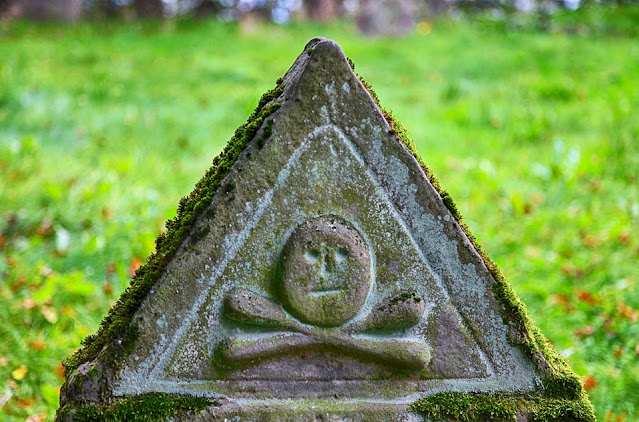As a society, we are getting better with encouraging people to maintain stronger boundaries and cut toxic people out of their lives...even if they are family. However, a lot of times this doesn't extend to people once they are dead. We are expected to ignore all the bad things they did in life and 'remember the best of them.'
This can be extremely toxic if you have family members (or other people, not just family) who were horrible to you when they were alive. Death isn't a clean slate, and we have no responsibility to maintain ties with the dead if it is unhealthy for us!
Now, I don't think that we should just be cutting contact with the dead willy nilly, especially when it comes to the long dead. So much was acceptable (and not understood) at other times in history that if we cut ties with every ancestor (blood, spirit or path) that did things we wouldn't accept today...well we probably wouldn't have many people left to work with.
But we also need to remember that working with the dead is an energy exchange, and the more we work with a particular person, the more we 'keep them alive' in our hearts and minds. So we should definitely be mindful about who we are letting in, and who we want to keep out.
When it comes to the more recent dead, I think it's definitely reasonable to apply the same restrictions that we might on our living relatives. If I wouldn't be associating with you if were still alive, why should I spend a minute working with you now that you're dead.
I'm not someone who believes that the dead can't change, but I also don't believe that it's my job to rehabilitate my ancestors. If I choose to take up that work, that's fine, but no one should expect me to devote myself to helping people who don't want helped. Or to exposing myself to people who personally trigger me (due to my personal memories of our interactions and how they make me feel).
The good thing is that you can absolutely cut ties with the dead that you no longer wish to associate with. In some cases, this is as simple as just making the choice to not engage. In other cases, you may have to do more intensive work to keep them from interfering in your life.
I'm a big fan of warding and setting clear energetic boundaries for who is welcome in my home..and who isn't. I also think that it's fairly rare for the dead to pester the living (without some kind of encouragement). But, if you are having issues, you may need to turn to stronger protection work, like banishing.
And of course, you will want to echo your spiritual work with physical work. This may mean making it clear to your living family that you don't want to visit the graves of certain ancestors, or be involved in any remembrances dedicated to them. Sadly, this may also mean that you have to reinforce your boundaries with relatives who don't understand why you don't want to toast you great-uncle.
Your reasons do NOT need to be made public. If you feel like sharing why you are cutting ties with a relative, that's one thing, but just remember you don't owe the dead anything, so choosing to distance yourself is YOUR choice. Remember, no is a complete sentence and it's not rude to keep your reasoning to yourself.
I'd also like to add that it's okay to change your mind. Perhaps you were okay with someone, but you then found out more information and no longer wish to engage with them. The same way that you might end a friendship if you found out your 'friend' was cheating on their partner, it's okay to cut ties with someone who you thought was a decent person...but then you found out otherwise.
And on the flip side, maybe you had serious issues with someone and cut all ties with them, but either you found out something new about their situation, or you have done enough personal work to have overcome your trauma regarding them. Maybe you want to reconnect, to reach out and find out more about them (and your relationship). Even if you hadn't worked with them before, you can reach out and start connecting. ((And it's not a set in stone thing either...if you try to connect with them and find out that it's just not going to work, they really are horrible, then cut those ties again!))
The dead may not be exactly the same as the living, but that doesn't mean we should allow them to do what they like. We can maintain our healthy boundaries and cut ties with people who are harmful to our mental well-being. Think of them as people first, and dead second, and trust your instincts. If their presence in your life brings you more sorrow than joy, perhaps it's time to think about letting go of the relationship.



